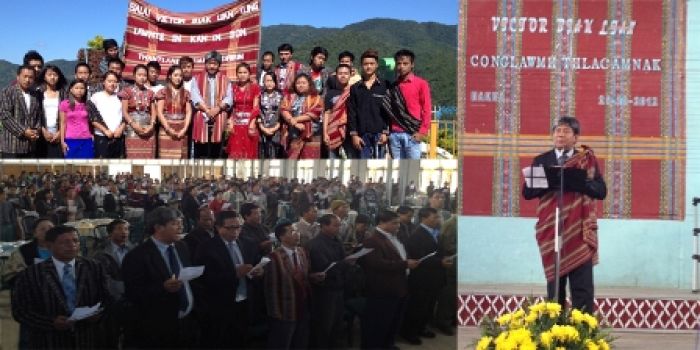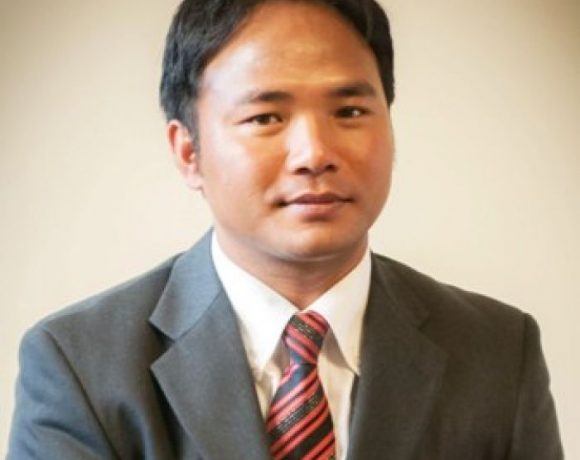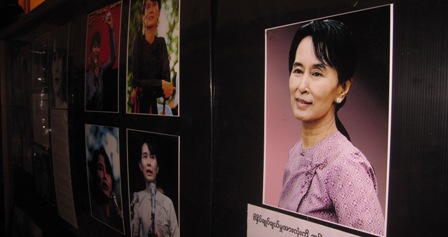My Return to Burma after 24 Years in Exile

13 November 2012: [CG note: Victor Biak Lian, Chin activist, ethnic leader, freedom fighter and winner of the 2010 St. Shephen’s Prize, made a short visit to ethnic states including his native Chinland in Burma after spending the last 24 years in exile struggling for human rights, democracy and freedom in the country.]
I am just writing to share about my recent visit to Burma, the first time in 24 years after I left the country in 1988.
The embassy of Myanmar in Bangkok, Thailand issued my visa on 5 October 2012, which was exactly the date I crossed the Indian-Burma border back in 1988. It was a social visa I had applied in accordance with advice and suggestions from friends.
I was asked to write a reason for my application to visit Burma. Jotting down in Burmese, I mentioned that the President of Burma sent an invitation to people from Burma in exile to come home. I didn’t divulge too much about my real intention on the one-page sheet of paper. Of course, I would have explained in details if I had been asked. Actually, it was partly true that I wanted to visit my family who I haven’t met for the last 24 consecutive years. My second plan was to visit liaison offices of ethnic armed groups in their respective areas, who signed a ceasefire agreement with the government.
Flying with TG (Thai Airways) to Rangoon on 15 October, I didn’t inform anyone of my arrival in the former capital. It was to my surprise that about 20 people, including close relatives and friends, showed up at the airport waiting for me. I realized my family must have let the cat out of the bag about the date of my trip.
A banner that reads ‘Welcome Victor Biak Lian, who loves his people’ by a group of students from a theological seminary from Hmawbi caught my eyes in happiness. It was very unexpected.
Before heading for Chin State, I made a visit to Taunggyi of Shan State, Moulmein of Mon State, Loikaw of Karenni State. It was tiring but my desire and enthusiasm kept me up and running. Domestic flights between Rangoon, Mandalay and Heho were quite good, apart from the fact that the air ticket had only information about the time for a passenger to get to the airport, not the time for boarding and flying.
I got gobsmacked and somehow astonished when I arrived in Hakha, Chin State in the early evening as about 400 people lined up wearing traditional dresses at the gate of my hometown to greet me. I was smiling and at the same time crying happy tears.
Hakha is still beautiful to me. But I could clearly see it being lonely without green trees and colourful flowers that used to surround the Chin town. The roads are in very poor conditions and living standards of the people in general have not much changed, apart from a few new good buildings.
I made a brief speech and after entering a few kilometres into the town, a group of women were waiting for me to carry on their backs all the way to my home. It must have been about 1 km that I was carried with a Chin blanket. It is a Chin tradition to show respect and love to someone they admire and care. So, I was happy.
My father prepared a prayer service where about 800 people from churches, communities and local organizations as well as relatives and friends turned up. Surprisingly, ministers from the government of Chin State were there and so were many government officers including police and intelligence. A local music band generously offered a dinner entertainment free of charge in my honour.
The rest of my days were filled with meetings and prayer services, where elderly and young people composed traditional and modern contemporary songs dedicated to me. Most of the choirs sang at worship services were also particularly made for me.
Speaking at the Hakha Baptist Church, I was quoted Mrs Johnson, wife of the last American missionary to Chin State, who said: “Remember! You are Christian and act like a Christian.”
At any public events, I highlighted the need to embrace righteousness, to combat any alcoholic activities including drinking and selling, and to fight against corruption. These are the first steps toward shaping our communities and building our land to become peaceful and healthy.
Now that the country is slowly opening up, we will have more people, both from Burma and abroad, visiting Chinland. We will be judged not by our appearance but by how we accommodate them morally and socially. If we love our land and our country, we don’t want to be the ones who make their images ugly.
This is my main message to my family, relatives and close friends in Hakha, Thantlang, Kalaymyo and elsewhere:
Our houses are not in a very good condition. They need to be well renovated or rebuilt. However, we shouldn’t feel discouraged and ashamed because of these conditions. What is more important for us is to lead a life with integrity and discipline. You might have known much about our ethnic brothers Karen, Kachin and Karenni, who have lived in the jungles for decades without proper houses and food.
Faces of many loved ones were not there any longer. My mother passed away with stroke at the age of 60 in 2001 and my brother, a member of the Chin National Front (CNF), died in 1990. Our family was broken into pieces following a series of harassment and pressure from the military intelligence because of my political activities. My two brothers and one sister later had to run away in search of refuge to India and Malaysia respectively while the rest of my family, mainly children and elderly, have just to grin and bear whatever comes to their doors.
I had all sorts of mixed feelings during my short visit to Burma.
By Victor Biak Lian






